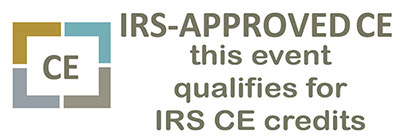Description
Most U.S. businesses are formed as pass-through entities, which include partnerships. If you are new to the subject or have worked in this area but need a quick review, this course will provide a firm grasp of the fundamental concepts, help you build a strong foundation of knowledge, and freshen up your analytical skills.
Talking about tax can sometimes sound like you're speaking a foreign language in front of your clients. You can leverage the tone of the course materials to explain complex issues with accuracy and confidence.
- Qualifies for IRS CE
This event is part of ISCPA's 2025 Tax School, designed to provide a convenient, comprehensive education about tax fundamentals for early-career tax staff in a series of courses. This series, designed for the ever-changing and complex world of tax, features high-quality presentations and an interactive, colleague-to-colleague approach to ensure participants develop the skills to apply their knew knowledge in practical settings.
Designed For
Objectives
When you complete this course, you will be able to:
- Identify the effects of investor contributions and distributions on their basis in a partnership or LLC interest.
- Identify the tax basis of assets transferred to a partnership or limited liability company (LLC) at formation.
- Recognize the tax consequences of a transfer of liabilities to a partnership or LLC in connection with property transfers at formation.
- Indicate the correct treatment of partnership income by a partner for selfemployment tax purposes.
- Distinguish between current and liquidating distributions.
- Recall whether special allocations called for in a partnership agreement will be allowable under the Section 704(b) regulations and when they will not be recognized by the IRS.
Highlights
- Basic tax structure of partnerships and LLCs
- Check-the-box elections to be taxed as a partnership
- Partnership distributions
- Compensatory payments to partners
- At-risk and passive activity limits
- Profit and loss allocations: general rules and restrictions
Advanced Prep
- Download PDF manual - view your upcoming events in "My CPE" on website
- Test your computer/device for compatibility with virtual meeting space well in advance of your webinar

If you need this reported to the IRS for CE credit, email CPE@idcpa.org
Register Now
Leaders
William Taylor
William (Bill) F. Taylor, CPA is a professional speaker and a CPA with a small tax and consulting practice. Bill is also an Adjunct Assistant Professor in the Masters of Business Administration program at the University of Mississippi. He recently retired as President of Renasant Bank in Water Valley, MS.
Bill has worked in the Accounting, employee benefit and investment fields for over 25 years, beginning his career as the Employee Benefits Coordinator in the Jackson, MS office of KPMG Peat Marwick and managing his own firm since 1999. A nationally known consultant and speaker, Bill has conducted seminars for the American Institute of Certified Public Accountants, the American Society of Pension Professionals and Actuaries, more than 40 state CPA and Bar associations and other organizations. He was awarded the AICPA Outstanding Discussion Leader award multiple times and the James L. McCoy Discussion Leader of the Year Award from Surgent CPE . Bill is the author of Taxation of Employee Benefits Volume I and Volume II, and his articles have appeared in numerous publications.
